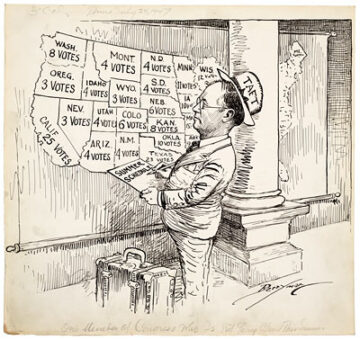by Jerry Cayford

“America,” by Paul Simon, from Simon and Garfunkel’s 1968 album, Bookends, speaks to our moment. What it says to me is a bit different from what I am reading about it from other people, but I don’t think I’m idiosyncratic. The key, as I see it, is to realize that the song is about America, not about Paul and his girlfriend Kathy taking a bus trip. For those who don’t know this song or haven’t heard it in decades, here is the studio recording. Spend three worthwhile minutes.
“America” opens with deceptive gentleness:
Let us be lovers, we’ll marry our fortunes together.
The gentleness primes us for the impact of the song’s climax. But the opening is also odd, the phrasing archaic. Nobody says, “Let us be lovers.” The verb “marry” is intransitive now; we don’t even say, “We’ll marry our children together.” And we don’t speak of our “fortunes” except as money. Since the rest of the song is completely naturalistic—anachronism is not its style—the oddness makes the phrases memorable, and marks them for study.
We hear a pop song many times on the radio (or wherever), then buy it and listen to it repeatedly. Soon, we know the lyrics by heart. We force our parents to listen to it. The whole song is present to us as a single concept, more than as a narrative arc. In this way, a three-minute pop song is more like a three-second slogan than like a thirty-minute show or a short story. I see “America” as answering a slogan like “Make America Great Again.” If we think Make America Great Again is the wrong concept, but don’t know how to counter it, perhaps we didn’t listen well enough when Simon and Garfunkel sang of America fifty years before. Read more »



 In the game of chess, there are dramatic moves such as when a knight puts the king in check while at the same time attacking the queen from the same square. Such a move is called a fork, and it’s always a delicious feeling to watch your opponent purse his lips and shake his head when you manage a good fork. The most dramatic move is obviously checkmate, when you capture the king, hide your delight, and put the pieces back in the box. But getting to either the fork or checkmate involves what’s known in chess as positioning, and for the masters, often involves quiet moves long in advance of the victory.
In the game of chess, there are dramatic moves such as when a knight puts the king in check while at the same time attacking the queen from the same square. Such a move is called a fork, and it’s always a delicious feeling to watch your opponent purse his lips and shake his head when you manage a good fork. The most dramatic move is obviously checkmate, when you capture the king, hide your delight, and put the pieces back in the box. But getting to either the fork or checkmate involves what’s known in chess as positioning, and for the masters, often involves quiet moves long in advance of the victory.